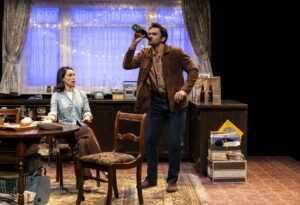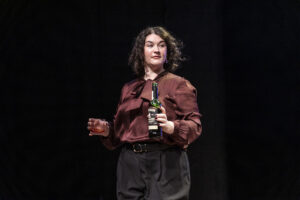Belvoir St Theatre, May 29
6.5/10
Do we let hate go, or cling to it, and let it define us? Wars breed resentments that last for decades. Those spawned by occupations last for generations, and are renewed by each fresh atrocity and its reciprocation, as we witness in Palestine/Israel. Most First Nations peoples arrive at an accommodation of sorts, ideally via a treaty. Even Ireland more or less resolved what they called, with heroic understatement, The Troubles.
Grace Chapple is a Northern Irish Australian, and her play is set in a little town near the Irish border, firstly during the full furnace of The Troubles, and then a decade later. She blesses her play with six characters who between them have sufficient warmth almost to lift the constant mizzle and the mist, and she comes at the political and religious antagonisms obliquely.

Instead, Chapple steeps her characters in The Troubles, and then watches them interact, whether as friends, lovers, firebrands or drunks. She wants to show us people coping and not coping – mostly the latter. When they do cope, it’s largely thanks to the warm inner glow provided by God’s compensation: Irish whiskey.
The play pivots around Deidre (Emma Diaz) and her inner circle, firstly when they’re dreaming of their futures, and then later, when most of those futures have gone astray, as futures tend to do. Deidre wants to be a writer, Jimmy (Raj Labade) wants to be a singer, Niamh (Mabel Li) wants to be a doctor and Mary (Ariadne Sgouros) yearns to move to New York. Conor (Adam Sollis) has cloudier ambitions, beyond seeing the bottom of his next glass, and winning an unwinnable war.
There’s small-town friction between the women over gaining the available men, and when we meet them a decade on, Niamh, now a psychiatrist in London, returns with her new fiancee, Harry (Philip Lynch). Being an English prosecuting barrister, he’s about as welcome as a plucked duck at a vegan barbecue.

These people are epic drinkers, and Harry, finding himself rather out of his depth, soon finds the contents of his stomach out of his mouth. Sympathy for him is thinner on the ground than sick after 800 years of English occupation, not helped by Harry’s Anglicanism amid a group that goes to mass almost as often as it opens a bottle. Almost.
Sgouros makes Mary Chapple’s key creation. She struts, swears and swaggers while drinking like there’s a prize to be won. Perhaps there is. She also has a scythe-like wit, and Sgouros times the pauses in her lines like a virtuoso woodwind player. Without her, the play might not beckon us in as successfully.
Directed by Hannah Goodwin, it’s among the rare works to graduate from the Downstairs theatre to the main stage. Initially, it moves at the patience-testing pace with which a pint of tap-poured Guinness settles, and then it accelerates – perhaps too fast. I rather liked the initial sluggish pace and incremental learning about these people. Later it starts to feel its neatly ticking plotline boxes from the playwrights’ handbook.
Harry, the classic outsider, is obviously a source of humour, but this potential wears thin, and Lynch struggles to sustain the intended accent. Goodwin blocks too many scenes as clear-cut confrontations, with one character facing off against the others, and the ending and its coda feel contrived. Essentially the text, directing, acting and design are good, but all effective art contains its own kernel of truth: the trick is adhering to it. Chapple’s lets hers slip away, just a little.
Until June 16.